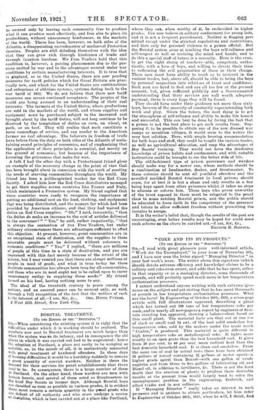BORSTAL TREATMENT.
[To ME EDITOR or THE " SPEOUTOR."3 SIR,—When considering the existing system it is right that the difficulties under which it is working should be realized. The numbers now sent to Borstal treatment are much larger than when the system was in its infancy, and in consequence the old Places in which it was carried out had to be augmented : hence the adoption of Portland, a place not easily to be accepted as suitable, as, in the minds of all, it is instinctively connected with penal treatment of hardened offenders. In these days of housing'difficulties it would be a hardship suddenly to remove a great quantity of convict warders. Neither is there the demand for their services for penal establishments that there used to be. In consequence, there is a large number of these at Portland. On the .other hand, these warders are men with human hearts,.and several of them acted as 'Scoutmasters to the local Boy Scouts in former days. Although Borstal boys are classified as soon as possible in various grades, it is evident these must remain a. certain quantity in the penal grade who are defiant of all authority and who must undergo a 'course of discipline, which is best carried out at a •place, like Portland,
where they can, when worthy of it, be reclassified in higher grades. Few now believe in solitary confinement for young lads, and it is not a frequent punishment. Neither is Dogging per- mitted except under the strictest regulations and restrictions, and then only for personal violence to a prison official. But the Borstal system aims at teaching the boys self-reliance and self-respect as well as training the mind and hands, and to do this a special staff of tutors is a necessity. Here is the crux, to get the right stamp of teachers—able, competent, enthu- siastic, with a love of boys, and willing to devote their time to redeeming the evil propensities of those in their charge. These men must have ability to teach or to instruct in the various trades, but, above all, should be able to bring the boys by personal magnetism into relations of trust and confidence. Such men aro hard to find and are all too few at the present moment, but, given sufficient publicity and a Governmental understanding that their services are well worth adequate payment, there is every hope they will be found.
They should have under their guidance not more than sixty boys, because-of the necessity of constantly superintending both work and play. Given the tutors, the nest thing is to get the atmosphere of self-reliance and ability to make life honest and successful. This can best be done by facing the fact that a prison is not the best place to get such results from. Sup- posing ft to be possible to obtain one of the now disused war camps or munition villages, it would seem to the writer the very best solution. Here, with ample housing accommodation for both boys and-staff, they could be taught the various trades, as well as agricultural education, and reap the advantages of Boy Scouts' training. They would not have the deadening knowledge of prison habits and confinement, and with suitable instructors could be brought to see the better side of life.
The old-fashioned type of prison governors and -warders should make way for a newer one, whose methods should he a combination of headmaster, doctor, and Scoutmaster. To these colonies should be sent all youthful offenders and the• so-called modified Borstal treatment in _local prisons should cease, for at best it is but a sham and only results in a boy being kept apart from other prisoners whilst it takes no steps to educate or reform him. Those boys who prove unworthy of the trust reposed in them must be relegated to the penal class in some existing Borstal prison, and the public should be educated to have faith in the competency of the governor and tutors _to allow sufficient freedom without permitting the inmates to escape.
It is the writer's belief that, though the results of the past are encouraging, even better results may be hoped for could some such scheme as the above be carried out.—I am, Sir, &c., KENNETH R. BALFOUR.






































 Previous page
Previous page